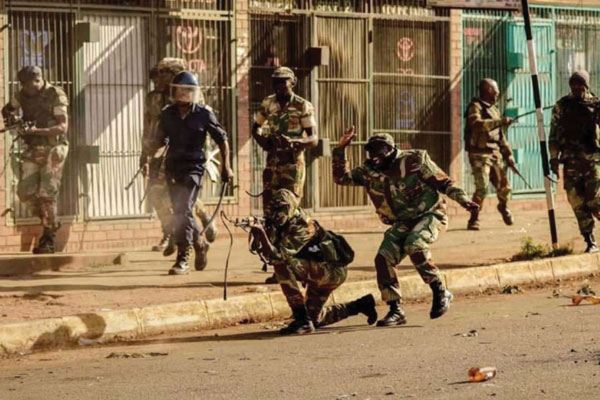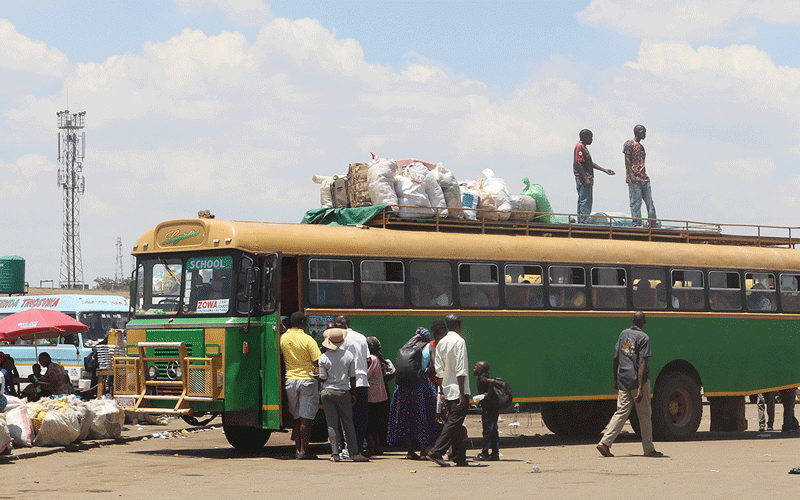
PRESIDENT Emmerson Mnangagwa yesterday appointed a seven-member panel to probe the fatal shootings which occurred in Harare on August 1 after soldiers opened fire on suspected MDC Alliance activists, killing seven people, injuring over a dozen others.
BY BLESSED MHLANGA
But opposition and civic leaders immediately cried foul over the composition and independence of the probe team, saying some of them were politically compromised and unlikely to produce an impartial report.
The team, which will be led by former South African President Kgalema Motlanthe, has been mandated to investigate the cause of the protests, identify the instigators, police conduct and establish how the military ended up shooting indiscriminately in the city centre during announcement of last month’s presidential election results.
Other members of the commission of inquiry include lawyer and National Constitutional Assembly losing presidential candidate Lovemore Madhuku, Zanu PF loyalist and academic Charity Manyeruke, Law Society of Zimbabwe (LSZ)’s ex-president Vimbai Nyemba, Rodney Dixon of the United Kingdom, former Tanzanian chief of defence forces General Davis Mwamunyange and former Commonwealth secretary-general Chief Emeka Anyaoku of Nigeria.
Mnangagwa, who leaves for China tomorrow, said he would swear-in the team upon his return so that they could start work and report to him within the next three months.
“The violence happened in the full glare of international media, the inquiry should also happen transparently in the glare of the international community,” he said.
“The terms of reference for the commission are as follows: To inquire into the circumstances leading to 1st of August, 2018 post-election violence, to identify the actors and their leaders, their motives and strategies employed in the protests,” Mnangagwa said.
- Chamisa under fire over US$120K donation
- Mavhunga puts DeMbare into Chibuku quarterfinals
- Pension funds bet on Cabora Bassa oilfields
- Councils defy govt fire tender directive
Keep Reading
“To inquire into the intervention by the Zimbabwe Republic Police in the maintenance of law and order, to investigate the circumstances which necessitated the involvement of the military in assisting in the maintenance of law and order,” he said.
Police and Zanu PF have already blamed MDC Alliance leaders, particularly Tendai Biti and youth leader Happymore Chidziva among other leaders, as the brains behind the violent protests.
Biti was arrested and charged for inciting the violence, while police are still on the hunt for Chidziva.
MDC Alliance spokesperson Welshman Ncube said while they welcomed the announcement of the commission, they had reservations over its composition and terms of reference which were not clear.
He said it was worrying that whereas there was a direct term of reference dealing with the police action, there was no direct term of reference addressing the question of who ordered the army into the streets.
“What orders were given to the army, before you can come to the question of whether or not the force which was used was justified in the circumstances?” Ncube asked. “Surely, you ought to inquire as to what were the circumstances which necessitated the calling in on the army. Who gave the orders and did the orders include shooting the victims in the back?”
Ncube said the real reason the commission was being set up should be to investigate how the army ended on the streets, shooting unarmed civilians in the back.
“The only reason of the commission of inquiry is that the army shot unarmed civilians in the back while they were running away. Otherwise need not for that they would be no commission of inquiry,” he said.
Ncube went on to single out Madhuku and Manyeruke, saying the two could not pass for independent commissioners given their political stance in the just-ended general elections. He, however, hailed the international component of the commission.
“The international members seem to be sufficient, experienced and sufficiently independent. To me, perhaps Nyemba, despite all the appointments to State institutions, also has a sufficiently broad history of independence as LSZ president,” Ncube said.
He said Manyeruke was a Zanu PF apologist and campaigned for the ruling party in the just-ended elections.
“In my respectful view, she (Manyeruke) is not sufficiently distanced from our partisan politics to be able to act independently and impartially and fairly in this matter,” Ncube said.
“Equally, Madhuku might be a lawyer, but such a player so closely involved with our politics as a presidential candidate, as a legal practitioner for one of the presidential candidates, Thokozani Khupe. I am aware that he is also a lawyer representing one other party in the on-going electoral petition. In my view, his eyes are so clouded. It will be well nearly impossible for him to distance himself from the dust of conflict with has imbued our politics.”
Political scientist, Ibbo Mandaza raised the same concerns, saying the local component of the commission was compromised. He noted that this was akin to Mnangagwa and his deputy (Constantino Chiwenga) investigating themselves.
“We were always suspicious that the commission of inquiry might end up as an inside job. In which case, it would be ridiculous to have Mnangagwa and Chiwenga investigating themselves,” he said.
Mandaza said there was no need for a commission in the first place because soldiers were captured live on camera shooting and killing unarmed civilians.
“We saw it on TV. We saw soldiers no more than 20, one can easily identify those persons and not to mention who gave the orders,” Mandaza said.
“Secondly, it’s clear that when the soldiers arrived, the crowd had become tired. Many had left and when the soldiers arrived, most ran away and they were pursued and in my view killed in cold blood.”







